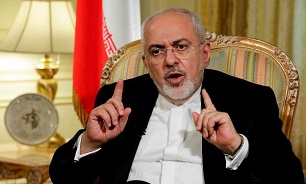Iran says if US pulls out of deal, it likely will do
 TEHRAN, (Defapress) – In a wide-ranging interview, Zarif said a US withdrawal from the landmark 2015 accord would undermine Trump's talks with North Korea by proving that America reneges on its promises.
TEHRAN, (Defapress) – In a wide-ranging interview, Zarif said a US withdrawal from the landmark 2015 accord would undermine Trump's talks with North Korea by proving that America reneges on its promises.
He said if Trump re-imposes sanctions, "basically killing the deal," Iran would no longer be bound by the pact's international obligations, freeing it up to resume enrichment far beyond the deal's strict limits.
"If the United States were to withdraw from the nuclear deal, the immediate consequence in all likelihood would be that Iran would reciprocate and withdraw," Zarif said.
He added "There won't be any deal for Iran to stay in." As Zarif spoke in New York on Tuesday, Trump was meeting at the White House with French President Emmanuel Macron, who has been leading an effort by France, Britain and Germany to find "fixes" to the deal that would satisfy Trump's objections.
Iranian Foreign Minister Mohammad Javad Zarif said in an interview with the Associated Press on Tuesday that if the Trump administration withdraws from the Iran nuclear agreement than Iran could abandon the deal as well.
Mean while, Trump said in a press conferencce with his French counterpart that if Iran ever threatens the United States, "they will pay a price like few countries have ever paid."
Iran has outright rejected any changes to the deal, arguing that it's unfair to impose more demands beyond what Tehran agreed to already.
Trump's strategy relies on the assumption that if the US and the Europeans unilaterally agree to new demands, Iran will back down and voluntarily comply in order to continue enjoying the benefits. Under the 2015 deal brokered by President Barack Obama and world powers, Iran agreed to nuclear restrictions in exchange for sanctions relief.
As Trump prepares for a high-stakes summit with North Korean leader Kim Jong Un aimed at resolving nuclear weapons concerns, Zarif emphasized that US credibility was at stake. He said Iran would welcome lower tensions on the Korean Peninsula, but that Trump was showing the world that the US is "not a trustworthy, reliable negotiating partner."
"They're prepared to take everything that you've given, then renege on the promises that they have made in the deal," Zarif said. "That makes the United States a rather unlikely partner in any international agreement. And unfortunately this track record is not just limited to the nuclear deal. It includes the Paris climate agreement, the Trans-Pacific Partnership, and a lot of other freely undertaken commitments of the United States."
Iran has long stressed its nuclear program was peaceful and not oriented toward building weapons. In the interview, Zarif suggested that those concerned that Tehran was racing toward a bomb would have much more to fear if it were no longer bound by limits on its enrichment and processing.
"It would be a completely different situation, from the perspective of those who made a lot of noise about Iran's nuclear program to begin with," he said.
He also pointed out that if Trump upends the nuclear deal, Iran could also choose to leave the global Nuclear Non-Proliferation Treaty, which aims to stop the spread of nuclear weapons. Iran signed that treaty decades ago, and though Zarif said Iran's government isn't advocating an exit, it is "one of the options that is being advocated by some" in Iran.
Zarif spoke to the AP at the official residence of Iran's ambassador to the UN, alongside Central Park. The top Iranian diplomat is in the United States this week to salvage the deal, while laying the groundwork for the United States to bear the blame on the global stage if Trump ultimately pulls out.
Addressing the conflict in Yemen, he said Iran is urging "everybody" to stop attacking civilian areas — including the Houthis.
US Ambassador to the United Nations, Nikki Haley, has paraded missile parts ostensibly recovered in Saudi Arabia in front of reporters and UN Security Council diplomats, claiming that they bear markings and other characteristics proving their Iranian origin. But Zarif laughed off her claims. "I'm not saying Ambassador Haley is fabricating, but somebody is fabricating the evidence she is showing," Zarif said.
Regarding Iran's presence in Syria, Zarif said "we are there as long as that objective needs our presence, and as long as the Syrian government asks us to be there."
Message end
